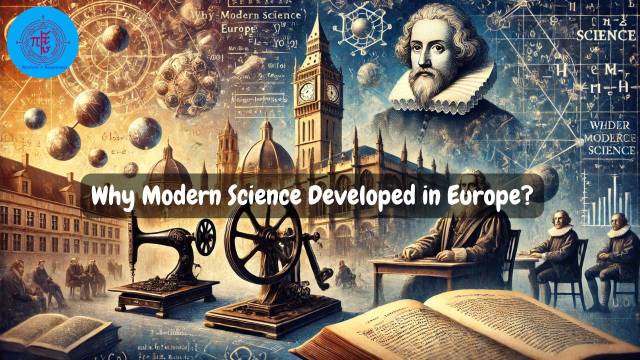
Why Modern Science Developed in Europe?#
Introduction#
A question that often comes to mind is: Why has scientific progress been so significant in the past 400 years, and why did it primarily take place in Europe? The world is vast, with many ancient civilizations contributing to human knowledge—so why does modern science seem so Eurocentric? In this article, I explore the answers to these questions.
While Europe’s scientific dominance in recent centuries is undeniable, it is crucial to recognize that scientific knowledge has been cultivated across diverse cultures throughout history. Ancient civilizations in Africa, the Middle East, China, India, and the Americas made significant contributions to mathematics, astronomy, medicine, and other scientific fields. In recent times, there has been a growing effort to decolonize the history of science and acknowledge the vital role of non-Western cultures in shaping our understanding of the natural world.
The rise of modern science in Europe can be attributed to a combination of historical, cultural, social, and economic factors. However, it is misleading to say that scientific progress has been exclusive to Europe. Knowledge has always been a shared human endeavor, and in the modern era, scientific advancements have become increasingly global, with contributions from researchers across all continents.
The factors of scientific progress in Europe include:
Colonialism and Imperialism#
European colonialism and imperialism led to the exploitation and subjugation of many regions outside Europe. While this had negative consequences, it also facilitated the transfer of knowledge, resources, and technology from colonized territories to Europe.
Historical Context#
Europe underwent the Renaissance and the Enlightenment periods, which were characterized by a revival of interest in art, culture, and learning. These movements encouraged critical thinking, experimentation, and the pursuit of knowledge, laying the groundwork for scientific inquiry.
Institutional Support#
European countries established universities, academies, and scientific societies that provided a platform for scholars and scientists to collaborate, exchange ideas, and conduct research. Institutions such as the Royal Society in England and the Académie des Sciences in France played crucial roles in fostering scientific innovation.
Exploration and Trade#
European exploration and trade routes expanded during the Age of Discovery, leading to increased exchange of ideas, cultures, and knowledge between Europe and other regions. This facilitated the transmission of scientific knowledge and technologies.
Political Stability#
Relative political stability in Europe compared to other regions allowed for long-term investments in scientific research and education. Patronage from monarchs, nobles, and wealthy individuals also supported scientific endeavors.
Technological Advances#
Europe experienced significant technological advancements, such as the invention of the printing press, which facilitated the dissemination of scientific knowledge through printed books and journals. Although the first known printing press was developed in China during the Tang Dynasty (circa 7th century CE), using woodblock printing. By the 11th century, Bi Sheng invented movable-type printing using clay and later metal characters during the Song Dynasty. However, the most well-known printing press was Johannes Gutenberg’s invention in Europe (circa 1440 CE). His Gutenberg press, based on movable metal type, revolutionized mass printing and significantly contributed to the spread of knowledge during the Renaissance.
Competition and Collaboration#
Competition among European nations and scientific rivalries spurred innovation and discoveries. At the same time, collaboration and exchange of ideas between European scientists and scholars from other regions contributed to scientific progress.
Geographical Factors#
Europe’s geographical proximity to other civilizations and continents facilitated cultural exchange and the diffusion of knowledge. Trade routes connected Europe to the Middle East, Africa, Asia, and the Americas, allowing for the exchange of goods, ideas, and technologies.
Political and Religious Institutions#
Europe experienced significant political and religious transformations during the Renaissance and the Enlightenment. The decline of feudalism, the rise of nation-states, and the separation of church and state created an environment conducive to scientific inquiry and intellectual freedom.
Innovation Ecosystem#
Europe’s economic and social structures encouraged innovation and entrepreneurship. The rise of capitalism, the emergence of a merchant class, and the development of banking and financial systems provided incentives and resources for scientific research and exploration.
Scientific Culture#
Europe developed a culture that valued empirical observation, experimentation, and critical thinking. The Scientific Revolution challenged traditional authorities and dogmas, paving the way for new ideas and discoveries.
Language and Communication#
The spread of scientific knowledge was facilitated by the widespread use of Latin & English as a scholarly language and later by the printing press, which made it easier to disseminate scientific works.


Comments: